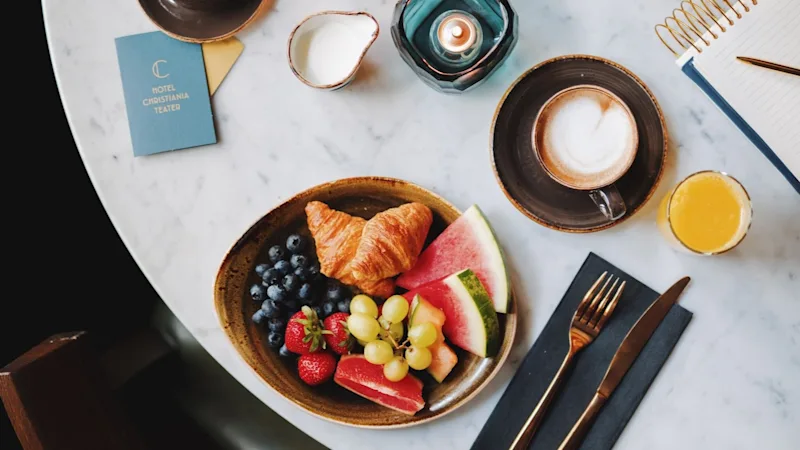Sofia turned maligned oysters into a culinary success
When chef Sofia B. Olsson couldn't find anyone to supply her with the disparaged Pacific oyster, she donned waders and took matters into her own hands. Today, the oyster is a major culinary success around the world.
The taste of minerality, salt, and the Swedish west coast.
Sofia stands in the archipelago, having just shucked her first Pacific oyster, also known as the Japanese oyster – a wild oyster that has been criticised and feared. Many consider it an alien species, with some even calling for its eradication.
But Sofia discovered that it has a wonderful texture. A little firmer than regular oysters, slightly larger, and somewhat lumpier – more authentic.
Sofia became fascinated. The Japanese species must make its way onto the menu at VRÅ in Gothenburg, where she is the head chef.
All her regular suppliers refused to deliver Pacific oysters. That's when Sofia met Lotta Klemming. The diver had seen the abundance of oysters along the entire coast and wondered why no one harvested them
Sofia was convinced and simultaneously found two of her greatest visions in one – a woman leading the way in a male-dominated profession, and a sustainable ingredient that everyone else considers useless.
Role model of the year: "Strawberry stands for equality"
Together with her colleague Frida Ronge, Sofia B. Olsson is a chef in whom Strawberry owner, Petter Stordalen, truly believes. Both chefs have grown up with a genuine interest in seafood and gained Stordalen's trust. Sofia and Frida started VRÅ at Clarion Hotel® Post in Gothenburg together, and restaurant which Sofia now manages on her own.
In addition to running one of the city's best seafood restaurants, Sofia is known for advocating for equality, education, and good leadership in the restaurant industry.
But how does a passion for seafood fit with a passion for equality? Sofia becomes enthusiastic:
"I push uncomfortable topics and challenge the macho culture. It's important to fight for equality and an inclusive restaurant environment."
In 2022, stories emerged of sexual harassment at a well-known restaurant in Sweden. This prompted Sofia and several chefs and bar owners to rally around the hashtag #härtardetslut ('it ends here'). Later, she became the chairperson of the association Framtidens Krogkultur, which actively works towards an equitable and attractive industry, free of abuse or violations. Sofia emphasises that she consciously joined Strawberry because it's an employer that stands for zero tolerance regarding sexism, racism, and homophobia.
"But everything is actually interconnected. What drives me is the vision of a sustainable restaurant in every aspect, From locally sourced, organic ingredients, to economics and sustainability, including social sustainability," says Sofia.
"Of course, problems will always arise on occasion, like harassment or not being able to source oysters... I then focus on solving these issues based on my vision. It's about sustainability throughout the entire restaurant."
A Striking Hotel Atmosphere
As we chat, Sofia has been showing us why VRÅ merits its label as one of Gothenburg's best restaurants. Here, they serve local ingredients from sea and land, drawing inspiration from Japan. The vegetables are grown on the rooftop of the Clarion Hotel® Post. Both the restaurant and the hotel are housed within the old post office building in Gothenburg, where the venerable meets the new.
"It's a truly striking atmosphere," says Sofia.
The menu focuses on the finest seasonal ingredients, including seafood, sashimi, and not least: oysters.
We must therefore return to the sea. Just before Sofia tasted the Japanese oysters for the first time, she had taken the entire staff to Grebbestad. They wore waders and used diving masks. In the sea, Lotta Klemming was clad in diving gear. They wanted to see her and learn from her.
"It's Completely Mad!"
At the beginning of the 2000s, the Japanese oyster spread along the entire beautiful west coast of Sweden.
Everyone saw it as a threat, explains Sofia, but she wondered what the actual difference was compared to the ones already found there. The French oysters looked exactly the same.
"I did some research, and it turned out they were the same species. We had an abundance on the west coast, while we were importing tonnes of the same species from France every year.
"It's completely mad; we should be eating local. So, I checked with suppliers, but no one could deliver," says Sofia. "Until I found Lotta, that is."
"It was a match made in heaven."
The Chef's Ultimate Meal
Lotta is a third-generation oyster diver and the only woman in Sweden in her profession. She shared the same thoughts as Sofia. Why not sell the abundant oysters from the west coast? Together, they picked and tasted, concluding that the flavour was even better than the French ones.
"We think they're absolutely fantastic oysters."
Sofia ordered oysters from Lotta, who dived, picked, cleaned, and delivered the seafood in wooden crates to VRÅ. They were the first to serve the maligned oyster. Things quickly escalated. The two women were invited to give lectures about the Pacific oyster in London, Stockholm, and Gotland. They lectured, inspiring others and spreading the gospel of the new oyster.
"It became a trend that quickly spread internationally. Now, everyone has Japanese oysters, from fish shops to fine restaurants. This results in shorter transport, it's better for the marine environment, and it's a win-win all the way. There aren't many foods that are exclusively positive, but this is one," says Sofia.
And this is precisely what the chef herself would describe as the ultimate meal one can have: Eating at a restaurant that excels in every aspect.
"The food is delicious, you know the seafood is local and properly sourced, and you've heard from friends that the staff are nice to each other in the kitchen. You can enjoy it all with a clear conscience!"
Read Sofia's top tips for restaurants in Gothenburg here.
You can book a room and table at the venerable and trendy Clarion Hotel® Post here.
Gothenburg


